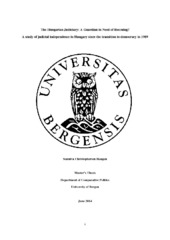| dc.description.abstract | This thesis investigates the state of the Hungarian judiciary, in terms of judicial independence and authority, asking how this has developed since the transition to democracy in 1989-1990, and why. The focus is on both the ordinary judiciary and the Constitutional Court, which is a separate institution, led by its own administrations. Judicial independence is a scholarly field that has received renewed attention in Hungary after the victory of Fidesz in the general elections of 2010, which brought fundamental changes in Hungarian constitutionalism, and the conditions and functioning of the judiciary. Much of the attention has been given on Hungary's Constitutional Court, which from its beginning in 1990 developed a rich and extensive jurisprudence, giving it an international reputation as a powerful and important court. However, the waves of post 2010 constitutional amendments and the new 2012 constitution, negatively affected the Court, changing its selection process, composition, jurisdiction and procedures. The ordinary judiciary, which took longer time to establish its independence after the 1989 transition, has also recently undergone reforms, ostensibly aiming to make it more efficient and suitable for a democratic society. The changes to the judiciary have been criticized by the European Union, who claims that some of the changes contravene European standards. Through an exploratory case study, the thesis examines the processes, events and changes that have shaped the development of judicial independence in Hungary, and seeks to identify the underlying causal mechanisms that have led to the current situation. The study is based on key informant interviews conducted during fieldwork in Hungary, November 2013, supported by secondary sources. The main findings in this thesis are: firstly, that the sweeping victory of Fidesz in the general elections in 2010, and the subsequent constitutional changes, left the Constitutional Court weakened, with limited jurisdiction and a diminished role in the state organization. Secondly, that the new system of justice administration introduced to the ordinary judiciary in 2011, and in particular the broad powers of the President of the National Office for the Judiciary, which are unprecedented in European practice, threatens judicial independence in Hungary. | en_US |
